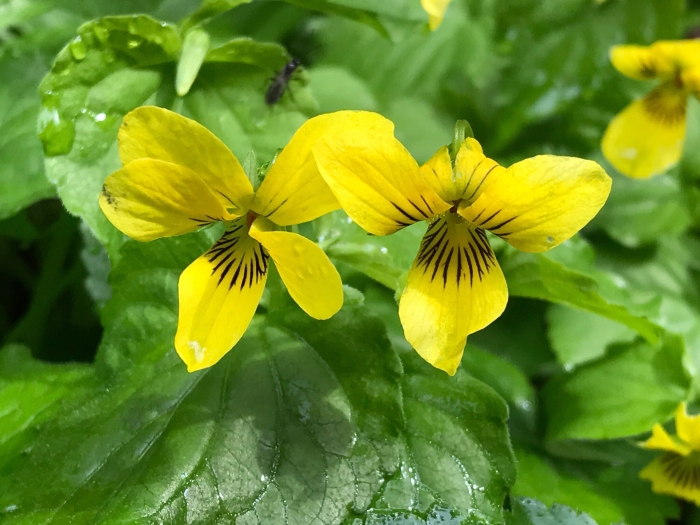Pioneer Violet
(Viola glabella)
Pioneer Violet (Viola glabella)
/
/

rappman
CC BY 4.0
Image By:
rappman
Recorded By:
Copyright:
CC BY 4.0
Copyright Notice:
Photo by: rappman | License Type: CC BY 4.0 | License URL: http://creativecommons.org/licenses/by/4.0/ | Rights Holder: rappman | Publisher: iNaturalist | Date Created: 2017-04-11T19:16:41Z |

















































Estimated Native Range
Summary
Viola glabella, commonly known as Pioneer Violet, is a deciduous perennial herb that is native to moist, shady forest floors and streambanks in the Pacific Northwest of the United States and Canada. It typically grows to a modest size of 0.1 m (4 inches) tall by 0.2 m (8 inches) wide. The Pioneer Violet is characterized by its heart-shaped leaves and bright yellow flowers, which are particularly showy from April to July. The flowers feature distinctive dark purple nectar guides on the front of the lower three petals, which contrast with the yellow petals and attract pollinators. After blooming, the plant dies back to its roots in autumn.
The Pioneer Violet is valued for its charming flowers and ability to thrive in shady conditions, making it a suitable choice for woodland gardens, shaded borders, and naturalized areas. It is also used for its ornamental foliage, which adds texture to garden compositions. This violet requires consistently moist, well-drained soil and can tolerate a range of soil types, including acidic and neutral soils with a pH between 6 and 6.5. It is sensitive to high pH levels, which can cause chlorosis. While it can grow in part shade, it also adapts to full sun if sufficient moisture is provided. Gardeners should be aware that Viola glabella can self-seed and spread, which may be considered invasive in some settings.CC BY-SA 4.0
The Pioneer Violet is valued for its charming flowers and ability to thrive in shady conditions, making it a suitable choice for woodland gardens, shaded borders, and naturalized areas. It is also used for its ornamental foliage, which adds texture to garden compositions. This violet requires consistently moist, well-drained soil and can tolerate a range of soil types, including acidic and neutral soils with a pH between 6 and 6.5. It is sensitive to high pH levels, which can cause chlorosis. While it can grow in part shade, it also adapts to full sun if sufficient moisture is provided. Gardeners should be aware that Viola glabella can self-seed and spread, which may be considered invasive in some settings.CC BY-SA 4.0
Plant Description
- Plant Type: Herb
- Height: 0.2-1 feet
- Width: 0-2 feet
- Growth Rate: Moderate
- Flower Color: Yellow
- Flowering Season: Spring, Summer, Fall
- Leaf Retention: Deciduous
Growth Requirements
- Sun: Full Sun, Part Shade
- Water: Medium
- Drainage: Fast, Medium, Slow
Common Uses
Bee Garden, Butterfly Garden, Deer Resistant, Drought Tolerant, Fragrant, Groundcover, Low Maintenance, Showy Flowers, Water Garden
Natural Habitat
Moist, shady forest floors and streambanks in the Pacific Northwest
Other Names
Common Names: Stream Violet
Scientific Names: Viola glabella , Viola californica , Viola glabella var. remotifolia , Viola biflora var. sitchensis , Viola canadensis var. sitchensis
GBIF Accepted Name: Viola glabella Nutt.